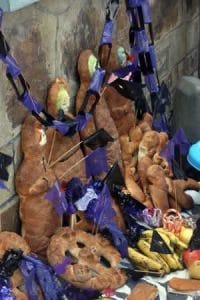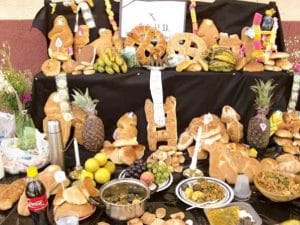Where else in the world do people celebrate their dearly departed by making effigies of them out of bread – Bolivia is one of a kind in so many ways!
Throughout Latin American culture you can find examples of cultural fusion, between indigenous traditions and the Spanish influence which arrived from the 15th and 16th centuries. The 1st November is a prime example of this, where All Saints Day is observed both as a Christian celebration as well as for reasons that go back well before the Spanish arrived.
Anyone who watched the Grand Prix over the weekend, or went to almost any Halloween party, will be familiar with the Mexican skull design from their “Day of the Dead”, which celebrates both Christian and indigenous traditions. Less familiar however is the equally fascinating customs which are still maintained throughout Bolivia – read on to find out more!

(It must be noted that very few written records exist of pre-Spanish cultures in South America, meaning many traditions (and the reasons for them) may have been distorted over the centuries. The following is one of a number of interpretations of their tradition, but is our favourite so we’re sticking to it!
One of the most significant cultures in the Bolivian Andes is the Aymara, which existed for at least several hundred years before the Spanish arrived. Much like many Andean cultures, their religion is largely centred around worshipping the natural world, with mountains, animals and even the earth itself being their Gods. They do share the Christian belief that there is an afterlife for us humans, however they do differ in one sense, in that the dead (or their spirits at least) have a tendency to return to the land of the living from time to time.
This “inter-world” travel reaches its peak around early November, which is one reason why they are celebrated and commemorated during this time. The reason for the timing, it is believed, is because in the Andes we are currently coming to the end of the dry season where the land has been less productive, and entering the start of the planting season as the rains begin. So as to ensure a successful harvest, the Aymara would prepare offerings of food for their lost loved ones, so that they would be well fed and better prepared to contribute to the success of the crops as they return to the earth.
As such, on the night of the 31st October, almost every home in the Bolivian highlands will prepare a table containing some of the favourite foods and drinks of their deceased relatives. Alongside this, they also bake a range of loaves of bread, in the shape of their lost loved ones (known in Bolivia as “Tantawawas” or “Bread Babies”). Not only do we have bread effigies however, there are also bread horses to help them to carry all the gifts, and bread ladders to help them return to heaven (the reference to heaven is one example of the crossover between the ancient and the Christian beliefs).

This table serves as an altar until the following day (or sometimes two days), when the communities will celebrate the temporary arrival of the spirits among them, at which point it turns into a big party with music and dancing, and they can then also eat the food which was prepared in memory of the dead, including the bread babies themselves!
When this tradition was first explained to me, it was just a brief description, where I was told that Bolivian’s celebrate the dead by making bread models of them and then eating them… With the context above it makes a little more sense, but it no less unique, and fantastically bizarrely Bolivian!


